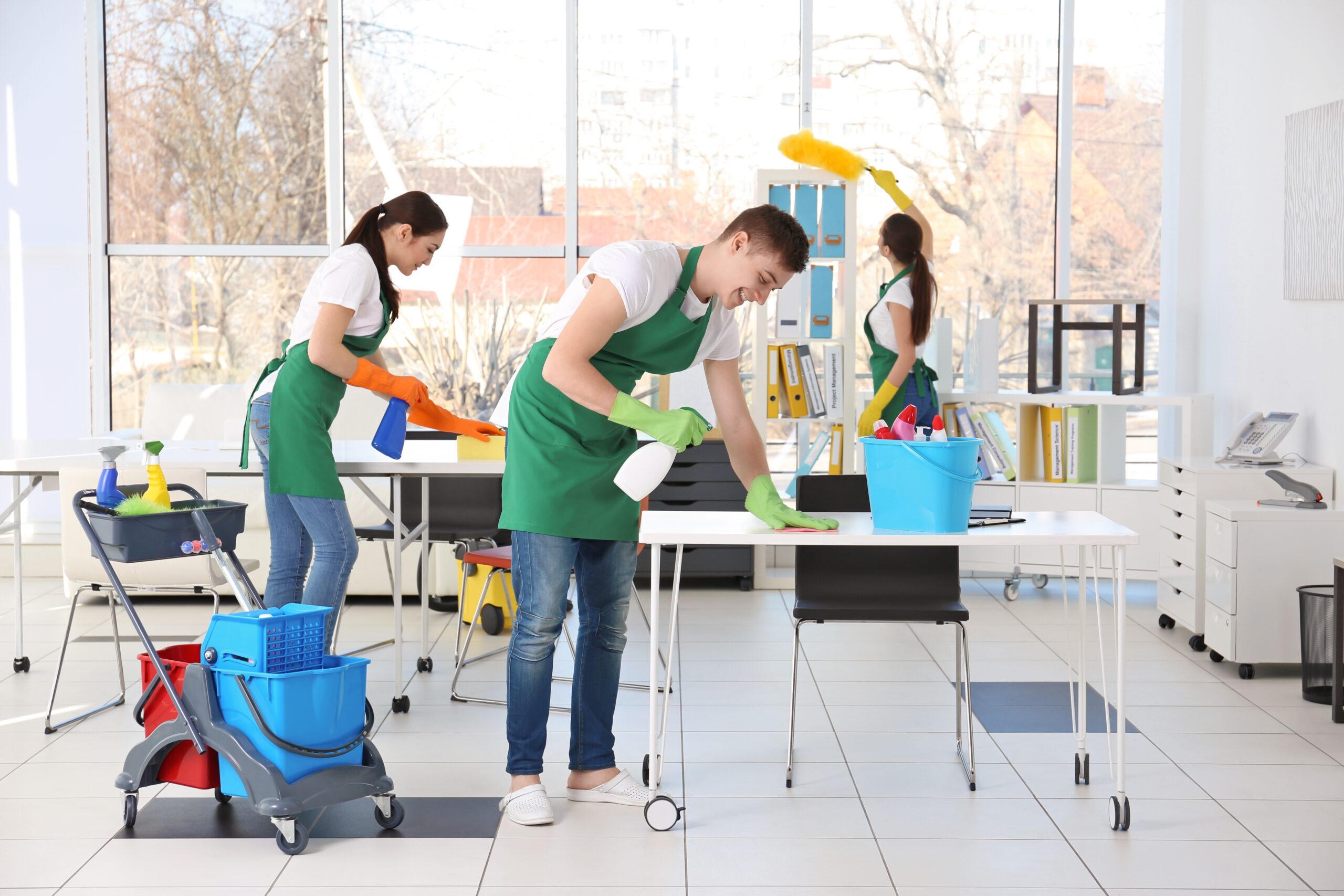
What Are Janitorial Services and Their Responsibilities
Understanding Janitorial Services: Broad Concepts and Specific Responsibilities
Janitorial services play a crucial role in maintaining the cleanliness, safety, and overall aesthetic appeal of various types of environments. From medical offices to retail stores, these services ensure that spaces are not only visually pleasing but also hygienic and conducive to health and productivity.
What are Janitorial Services?
At its core, janitorial services involve the cleaning and maintenance of buildings and spaces. This can range from regular cleaning tasks such as vacuuming, dusting, and mopping to more specialized services like deep-cleaning carpets, window cleaning, and sanitization. Janitorial services are essential in maintaining a clean, orderly, and safe environment.

Responsibilities in Different Settings
The scope of janitorial services can vary significantly depending on the type of space being serviced. Below are some examples of responsibilities in different environments:
Medical Offices
- Sanitization and Disinfection: Given the high risk of cross-contamination, janitorial services in medical facilities focus on rigorous sanitization and disinfection, especially in high-touch areas.
- Waste Management: Proper disposal of medical waste, including certain materials, is a critical responsibility.
- Floor and Surface Cleaning: Ensuring that all surfaces are free of contaminants and debris is vital to patient safety.
Retail Stores
- General Cleanliness: Regular cleaning tasks such as sweeping, mopping, and dusting are fundamental in maintaining an inviting shopping environment.
- Window Cleaning: Clean windows are essential for storefronts to attract customers and display merchandise effectively.
- Restroom Maintenance: Ensuring that restrooms are clean and well-stocked is vital for customer satisfaction.
Office Buildings
- Daily Cleaning: This includes vacuuming carpets, emptying trash bins, cleaning restrooms, and wiping down communal areas.
- Deep Cleaning: Periodic deep cleaning of carpets, upholstery, and air ducts to maintain a healthy work environment.
- Sanitization: Regular sanitization of workstations, especially in shared spaces, to minimize the spread of germs.
Other Businesses
- Customized Cleaning Plans: Depending on the business type, janitorial services may offer tailored cleaning schedules and tasks to suit specific needs.
- Exterior Cleaning: This may include tasks like sweeping, pressure washing, and graffiti removal, essential for maintaining the business’s external appearance.
- Event Cleanup: Some businesses may require specialized cleaning services post-events or gatherings.
Houses
- Residential Cleaning: This encompasses a range of services from regular housekeeping to deep cleaning tasks like oven and refrigerator cleaning.
- Seasonal Cleaning: Specialized services such as gutter cleaning and preparing homes for seasonal changes.
- Customized Schedules: Flexibility in scheduling to accommodate the homeowner’s lifestyle and preferences.
Janitorial services are not just about maintaining cleanliness; they are integral to creating a healthy, safe, and pleasant environment in various settings. The expertise and attention to detail provided by janitorial staff are indispensable in ensuring that spaces are not only clean but also welcoming and conducive to their respective purposes.

The Essential Janitorial Services Checklist
A comprehensive janitorial services checklist is vital for ensuring all areas of a facility are properly cleaned and maintained. Here’s a typical checklist that may be adapted depending on the specific needs of the facility:
Daily Cleaning Tasks
- Trash Removal: Emptying all trash bins and replacing liners.
- Dusting: Dusting surfaces, including desks, shelves, and other furniture.
- Floor Care: Sweeping and mopping hard floors, and vacuuming carpets.
- Restroom Maintenance: Cleaning and sanitizing toilets, sinks, and mirrors; replenishing soap, toilet paper, and paper towels.
- Kitchen/Break Room: Cleaning sinks, countertops, and appliances; restocking necessary supplies.
Weekly Cleaning Tasks
- Thorough Dusting: Including hard-to-reach areas like high shelves, blinds, and baseboards.
- Glass Cleaning: Cleaning interior windows and glass surfaces.
- Floor Treatment: Deep cleaning of floors, including buffing/waxing if necessary.
- Furniture Upholstery: Vacuuming and spot-cleaning chairs and sofas.
Monthly Cleaning Tasks
- Vent Dusting: Dusting air vents and changing HVAC filters as required.
- Deep Carpet Cleaning: Carpet shampooing or steam cleaning.
- Window Washing: Exterior window cleaning.
- Detailed Cleaning: In-depth cleaning of less-frequently used areas, like storerooms.
Specialized Cleaning Tasks
- Sanitization: Especially in healthcare settings or during flu season, focusing on sanitizing door handles, phones, and other high-touch areas.
- Biohazard Cleanup: In medical facilities, cleaning up biohazardous spills safely and effectively.
- Pressure Washing: Exterior cleaning of sidewalks, parking lots, and building facades.
- Event Preparation and Cleanup: Specific tasks to prepare for and clean up after events or large meetings.
Seasonal Cleaning Tasks
- Gutter Cleaning: Especially in the fall to prevent clogging.
- Deep Cleaning: Extensive cleaning tasks that are done annually, like deep cleaning of upholstery or comprehensive dusting of the entire facility.
- Pest Control Checks: Ensuring the facility is protected against seasonal pests.
Quality Control and Safety
- Inspection and Feedback: Regularly inspecting completed work and seeking feedback from facility management.
- Safety Checks: Ensuring all cleaning practices adhere to safety and health standards.
- Supply Inventory: Regularly checking and restocking cleaning supplies.

Customization for Specific Facilities
- Educational Institutions: Focusing on classrooms, cafeterias, and athletic facilities.
- Industrial Facilities: Special attention to machinery cleaning and floor maintenance.
- Retail Spaces: Emphasizing cleanliness of display areas and fitting rooms.
A janitorial services checklist is a dynamic tool, adaptable to the specific needs of various environments. It ensures that all essential cleaning tasks are completed methodically and consistently, maintaining a high standard of cleanliness and hygiene. In any facility, the role of janitorial services is paramount in creating a clean, safe, and welcoming space for all occupants and visitors.
Eco-Friendly Janitorial Services vs. Regular Janitorial Services: A Comparative Analysis
The cleaning industry has evolved significantly, with a growing emphasis on eco-friendly practices. Understanding the differences between eco-friendly and regular janitorial services is crucial for making informed decisions that align with sustainability goals and health concerns.
Eco-Friendly Janitorial Services
Core Principles
- Sustainability: Focuses on reducing environmental impact.
- Health-Conscious: Prioritizes the health of both the cleaners and the building occupants.
Practices and Products
- Green Cleaning Products: Uses biodegradable, non-toxic, and eco-friendly cleaning agents.
- Energy-Efficient Equipment: Utilizes equipment that conserves energy and reduces pollution.
- Water Conservation: Implements water-saving cleaning techniques.
- Waste Reduction: Emphasizes recycling and minimal use of disposable products.
Benefits
- Improved Indoor Air Quality: Reduces exposure to harsh chemicals.
- Safer Environment: Lowers the risk of chemical-related health issues.
- Eco-Conscious Brand Image: Enhances company image by demonstrating a commitment to environmental stewardship.
Potential Limitations
- Cost: Can be more expensive initially due to the cost of green products and practices.
- Availability: Not all janitorial services offer comprehensive eco-friendly options.
Regular Janitorial Services
Core Principles
- Efficiency: Focuses on cleanliness and efficiency in service delivery.
- Cost-Effectiveness: Prioritizes affordability and accessibility.
Practices and Products
- Traditional Cleaning Products: Often uses chemical-based cleaners that can be more effective on tough grime but potentially harmful to the environment and health.
- Standard Equipment: Uses conventional cleaning equipment without special focus on energy efficiency.
- Standard Cleaning Techniques: May not prioritize water conservation or waste reduction.

Benefits
- Effectiveness: Potentially more effective for heavy-duty cleaning tasks.
- Cost: Generally more affordable due to lower-cost products and methods.
Potential Limitations
- Health Risks: Increased exposure to toxic chemicals can affect indoor air quality and health.
- Environmental Impact: Higher potential for environmental harm due to the use of non-biodegradable chemicals and increased waste.
Choosing between eco-friendly and regular janitorial services depends on a range of factors including environmental impact, health considerations, budget constraints, and the specific cleaning needs of a facility. While eco-friendly services promote sustainability and health, regular services may offer cost-effectiveness and potent cleaning solutions. Ultimately, the decision should align with an organization’s values, priorities, and the specific needs of their facility.


